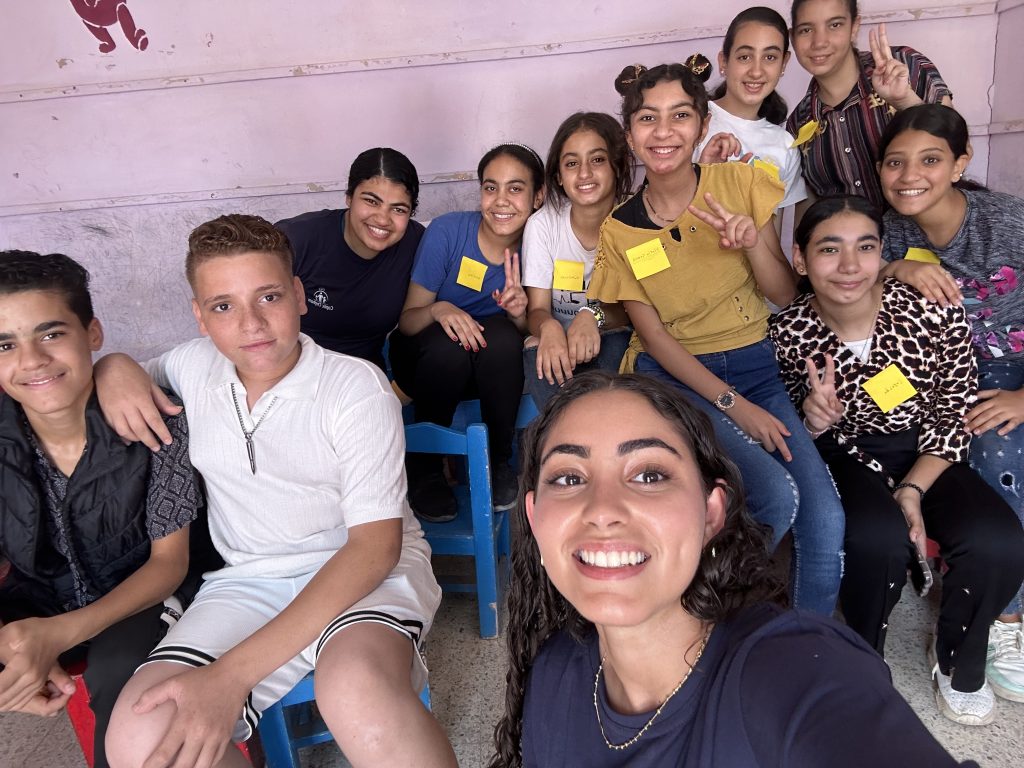
Marla with the children in Egypt.
Today’s guest post comes from Marla Hakim, a fellow who attended The 21 Trip. In this reflection, she shares how her understanding of Coptic identity deepened throughout the journey. For Marla, being a Copt is not just about heritage—it’s about living out a divine calling rooted in love, sacrifice, and enduring hope.
Coming into this trip, I thought being a Copt referred to our culture, faith, traditions, and Egyptian history. I also knew the Coptic Orthodox faith came from St. Mark’s preaching and the apostles. However, I discovered through The21 that being a Copt is much more than all of this.
Firstly, I learned that as Egyptians, we were blessed with an ancient history that was prepared to receive the teachings of Christ. The pharaohs were already monotheistic, which allowed them to understand our Lord Jesus Christ and the hypostases of God. They already believed in a union between heaven and earth; therefore, the idea of the Incarnation, Resurrection, Ascension, or Pentecost was easily accepted in Egypt. Even the concept of intercessions and saints was already present through the concept of deification in ancient Egypt.
So, we see that from the beginning of time, God had a plan for the land of Egypt, “whom the
Lord of hosts shall bless, saying, “Blessed is Egypt My people.” (Isaiah 19:25)
Secondly, in addition to preparing us to receive the faith, our Lord Jesus Christ Himself visited our land in Egypt. He blessed it with His presence and made our land a Holy land, giving us hope that He will never leave us. When we visited the Monastery of the Blessed Virgin Mary in el-Muharraq (Deir el-Muharraq) as well as the Virgin Mary Monastery in Dronka (Deir Dronka), I felt peace and silence that I never had before. I imagined Jesus as a baby playing on these grounds, growing up in these places, and experiencing the same childhood I once had. All I could think was how wonderful God is, and true to His word, allowing us to feel such beauty. He kept His promise to us: “In that day there will be an altar to the Lord in the midst of the land of Egypt, and a pillar to the Lord at its border.” (Isaiah 19:19) Not only is Deir el-Muharraq in the midst of the land of Egypt, but it is in the midst of the world, as we believe that Christ is the center of our lives.
Third, I saw that the people are incredibly resilient. Despite the persecution that has taken place, the Christians have kept the Orthodox faith rooted deep in their hearts, souls, and minds. While listening to stories from the families of The 21 Martyrs of Libya or the families of El Botroseya, we can see that they are proud of their faith. They are delighted to say that their sons and daughters, husbands and wives, mothers and fathers, and even neighbors are interceding on their behalf in the Paradise of Joy. They wish the best on those who have harmed them and those who wish evil upon them. A quote that struck me from one of the family members is, “If someone blind bumped into you, you wouldn’t yell at them.
Instead, you would forgive them and say they did not mean it. Likewise, those who commit crimes against us and martyr our families are blinded, and we only pray that God may open their eyes.” It is a pleasure for our people and church to have martyrs and saints who died in Christ. Our church is one of blood and faith, as the book of Revelation says, “I saw under the altar the souls of those who had been slain for the word of God and for the testimony which they held.” (Revelation 6:9) This is the beauty of the Copts of Egypt; they are forgiving, faithful, and always loyal to Christ.
Lastly, I was blessed with the opportunity to serve my brothers and sisters in Christ. The children were intelligent, playful, and giving. I saw in them what I wish to see in the Western world. They were caring toward each other as well as us, despite us being strangers to them. These children taught me the true meaning of Christianity: we are all One Body in Christ, no matter how far we are from one another. We believe that we will meet again in Heaven “according to the faith of God’s elect and the acknowledgment of the truth which accords with godliness, in hope of eternal life which God, who cannot lie, promised before time began.” (Titus 1:1-2) While I may never see these children again, I will never forget them, and I pray that we will meet again in the Kingdom of Heaven.
Therefore, this trip has taught me about my Coptic heritage and has further solidified my love for our church. There is no other church with a history like ours, no other religion, no other denomination, nor a group of people as brave and wise. The Copts of Egypt are blessed by God, and they keep the Word of the Lord always before them, “He shall cover you with His feathers, And under His wings you shall take refuge; His truth shall be your shield and buckler.” (Psalm 91:4) There is no other group that I have seen or heard of, besides my Coptic Orthodox Church, that continue to live by this verse. They are protected by the Lord throughout all ages, and His Gospel is engraved in them, as we see in the lives of the martyrs and daily in the Copts. As our Lord Christ says, “See, I have inscribed you on the palms of My hands; Your walls are continually before Me,” (Isaiah 49:16), the Copts have similarly tattooed His cross, permanently, on their hands and hearts so that they may never forget His love for them.
